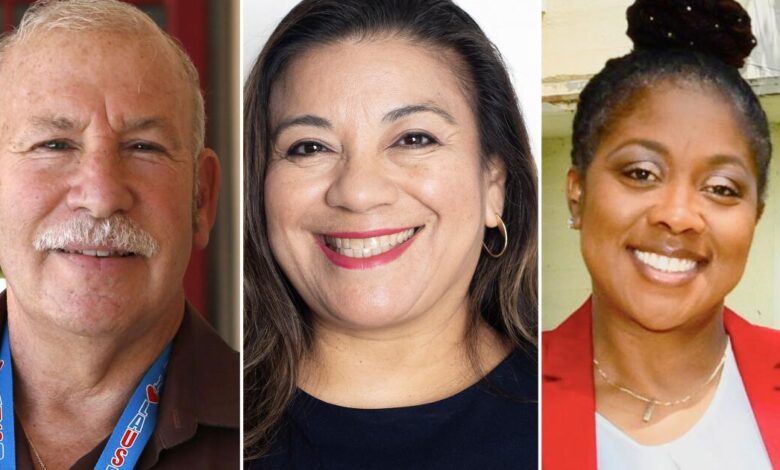Newly elected L.A. school board members vow to defend vulnerable students, staff against Trump

Newly elected Los Angeles school board members say they are united in a mission to protect the district’s most vulnerable — students and staff who are immigrants or LGBTQ+ — following wins that are generally a plus for Supt. Alberto Carvalho and the teachers union and a setback for privately managed charter schools.
All three of the newly elected or reelected board members are focused with apprehension on President-elect Donald Trump, who has stated his intent to deport immigrants, end diversity programs, limit the teaching of history he deems “woke” and unpatriotic, curtail rights recently extended to transgender students and shut down the U.S. Department of Education.
“I think that there’s going to be a lot of attacks on our most vulnerable students and our most vulnerable populations,” said Karla Griego, who was newly elected to replace retiring board member Jackie Goldberg. “And so we have to stand strong and lead as a district in defending our most vulnerable students, in defending all the things that we have made headway on and continue to fight for more.”
The big picture is that the seven board members of the nation’s second-largest school system will continue to define themselves as guardians of local families, which include many immigrants. Their stand could mark L.A. Unified as a target for Trump, who has vowed to withhold federal funding from school systems that oppose his agenda.
“With such a large population of immigrant families,” the districts needs “to assure the families that we’re here to support them, that we’re going to do whatever it takes to inform them, whether it’s through immigration clinics in our communities, through faith-based organizations,” said Sherlett Hendy Newbill, who will take over the seat held by George McKenna, who also is retiring. “I think that’s going to be a critical piece, just to help our families feel supported, especially with the threats from the new administration coming in.”
The newcomers’ defensive posture against Trump is in sync with the school board members they will join next week. Two weeks ago, the board, without opposition, declared the school system a sanctuary for immigrant and LGBTQ+ communities, while also calling for more politically informed civics education.
The tightest race was in District 3, which covers most of the west San Fernando Valley. In this contest, two-term incumbent Scott Schmerelson won a third and final term, winning 51.6% of the vote against middle school math teacher Dan Chang, who received 48.4%.
Declining enrollment is a big issue
In an interview, Schmerelson cited declining enrollment as a key problem going forward.
“Without improved enrollment, the school system cannot survive, and I am constantly beating the bushes, talking to neighborhood councils and making sure that people are aware of how wonderful our LAUSD schools are,” Schmerelson said.
Enrollment peaked at 746,831 in the 2002-03 school year and has been declining since. The current enrollment is about 409,500 — and that includes the recently added grade of transitional kindergarten for 4-year-olds.
Reversing enrollment decline is a tall order given the high cost of living in L.A. and the slowdown in immigration.
Pledges to keep Black student achievement program strong
Schmerelson also spoke of making sure that the school system’s special efforts to support Black students stay on track through its Black Student Achievement Plan.
“This is the first time that I can remember that our Black and African American students have risen with everyone else,” Schmerelson said, citing recent standardized test scores. “And I really do credit that to the BSAP program — the experiences that they have of visiting colleges and having additional social, emotional help, making sure the master schedule has all the courses that they need and things that they like to take. And you see that rise in scholars because of all of that.”
Activists have criticized the district for recently backing away from the program’s exclusive focus on Black students. After coming under legal pressure, L.A. Unified made the program race neutral — to abide by Supreme Court rulings against race-based programs. The district did not change the name of the program even though race no longer determines who will be helped.
Despite this change, district officials have insisted that they can still reach all Black students with significant needs.
“I’m just so proud of the BSAP program, and I want to make sure that we keep it solid,” said Schmerelson, who represents an area with relatively few Black students, but who spent much of his career as a principal in a part of the district with a large Black population.
All board members have spoken in similar terms about making sure that BSAP will uplift Black students.
Super-costly races
Schmerelson’s District 3 race came close to being the most expensive local school board campaign ever, with more than $7.84 million spent by outside groups on the two candidates.
Outside spending for Chang came from a political action committee anchored by retired businessman Bill Bloomfield, who, by himself, poured in about $4.9 million of more than $5.4 million, according to recent filings. Allied with Bloomfield, but spending far less, was the California Charter Schools Assn.
The L.A. teachers union, United Teachers Los Angeles, put in nearly all of the $2.4 million in outside spending on behalf of Schmerelson.
The candidates’ own campaigns combined to raise an additional $670,000.
Charters are public schools within L.A. Unified that are mostly outside of district control. They enroll about 109,000 students within district boundaries. Most charters are nonunion. Their supporters are concerned that the school system will put further limits on where and how they operate. If the elections had turned out differently, charter advocates probably would have pushed to reverse some restrictions now in place.
Griego will represent District 5, which takes in areas north and northeast of downtown, including Eagle Rock, Glassell Park and Echo Park. To the southeast, it includes the cities of Huntington Park, Maywood and South Gate. Helped by big spending from the teachers union, Griego was elected with 61% of the vote.
Charter advocates did not mount a campaign in District 5, but they generally favored Griego’s opponent, Graciela Ortiz, who benefited from a big-money outside campaign funded by Local 99 of Service Employees International, the district’s largest union for non-teachers.
Griego, a longtime teacher of students with disabilities, said she intends to advocate for these students: “At the federal level, they have not been funding special ed like they should, and so we need to make sure that we do that.”
There was no charter-favored candidate in District 1, which covers much of the south and southwest portion of the school system; Hendy Newbill won handily over Kahllid Al-Alim, getting 71% of the vote.
Hendy Newbill said the board majority is “pro-public school — from the public schools, worked in the public schools” — and that “changes the dynamics” for future decisions related to charter schools.
Such phrasing is worrisome to charter operators, who are quick to point out that their schools also are free and open to the public.
The teachers union scored two clear wins with Schmerelson and Griego, but Hendy Newbill won without union backing and considers herself teacher friendly but independent. The teachers union recently endorsed her but funded no campaign on her behalf.
Hendy Newbill has worked as a teacher, dean and coach and more recently as a senior advisor to McKenna.
Supt. Carvalho could look at the election results with some relief. Hendy Newbill defeated an opponent who was sharply critical of him. And Schmerelson was a member of the board that unanimously hired him.
In a rare occurrence, the majority of board members — Hendy Newbill and Griego, along with holdovers Rocio Rivas and Kelly Gonez — will be parents of current district students. It’s possible that there have never been as many parents of district students on the board.
“The lens is a little different having parents on the school board,” Hendy Newbill said.




